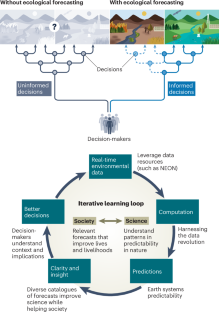Near-term ecological forecasting for climate change action
IF 29.6
1区 地球科学
Q1 ENVIRONMENTAL SCIENCES
引用次数: 0
Abstract
A substantial increase in predictive capacity is needed to anticipate and mitigate the widespread change in ecosystems and their services in the face of climate and biodiversity crises. In this era of accelerating change, we cannot rely on historical patterns or focus primarily on long-term projections that extend decades into the future. In this Perspective, we discuss the potential of near-term (daily to decadal) iterative ecological forecasting to improve decision-making on actionable time frames. We summarize the current status of ecological forecasting and focus on how to scale up, build on lessons from weather forecasting, and take advantage of recent technological advances. We also highlight the need to focus on equity, workforce development, and broad cross-disciplinary and non-academic partnerships. In this Perspective, the authors discuss the current status of ecological forecasting research, its role in helping to address the climate and biodiversity crises facing society and potential future directions, with a central focus on how to scale up ecological forecasting capabilities.


气候变化行动的近期生态预测
面对气候和生物多样性危机,需要大幅提高预测能力,以预测和缓解生态系统及其服务的广泛变化。在这个变化加速的时代,我们不能依赖历史模式或主要关注未来几十年的长期预测。在本《视角》中,我们将讨论近期(从每天到十年)迭代生态预测的潜力,以改进可操作时间框架内的决策。我们总结了生态预测的现状,并重点讨论了如何扩大规模、借鉴天气预报的经验教训以及利用近期的技术进步。我们还强调了关注公平、劳动力发展以及广泛的跨学科和非学术伙伴关系的必要性。
本文章由计算机程序翻译,如有差异,请以英文原文为准。
求助全文
约1分钟内获得全文
求助全文
来源期刊

Nature Climate Change
ENVIRONMENTAL SCIENCES-METEOROLOGY & ATMOSPHERIC SCIENCES
CiteScore
40.30
自引率
1.60%
发文量
267
审稿时长
4-8 weeks
期刊介绍:
Nature Climate Change is dedicated to addressing the scientific challenge of understanding Earth's changing climate and its societal implications. As a monthly journal, it publishes significant and cutting-edge research on the nature, causes, and impacts of global climate change, as well as its implications for the economy, policy, and the world at large.
The journal publishes original research spanning the natural and social sciences, synthesizing interdisciplinary research to provide a comprehensive understanding of climate change. It upholds the high standards set by all Nature-branded journals, ensuring top-tier original research through a fair and rigorous review process, broad readership access, high standards of copy editing and production, rapid publication, and independence from academic societies and other vested interests.
Nature Climate Change serves as a platform for discussion among experts, publishing opinion, analysis, and review articles. It also features Research Highlights to highlight important developments in the field and original reporting from renowned science journalists in the form of feature articles.
Topics covered in the journal include adaptation, atmospheric science, ecology, economics, energy, impacts and vulnerability, mitigation, oceanography, policy, sociology, and sustainability, among others.
 求助内容:
求助内容: 应助结果提醒方式:
应助结果提醒方式:


